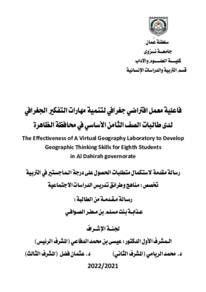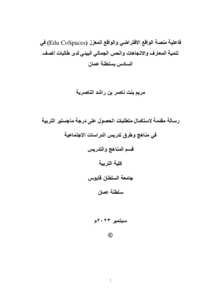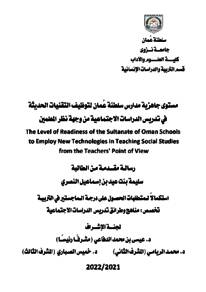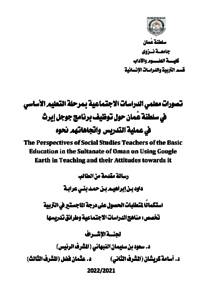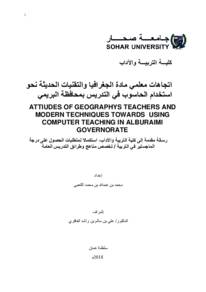Document
فاعلية معمل افتراضي جغرافي لتنمية مهارات التفكير الجغرافي لدى طالبات الصف الثامن الأساسي في محافظة الظاهرة.
Publisher
جامعة نزوى.
Gregorian
2022
Language
Arabic
Subject
English abstract
This study aimed to reveal the effectiveness of using virtual reality (Virtual Geographical Lab) in teaching social studies for developing geographical thinking skills for eighth-grade students in Al Dahirah Governorate. The study relied on the experimental approach based on a quasi-experimental design with an unequal control group. Which tests the effect of the independent variable, which is virtual reality (virtual geography lab), on the dependent variable, which is geographical thinking skills, where the study sample consisted of (60) female students from the eighth grade at Fatima Bint Asad School for grades (5-12) in Al Dahirah Governorate. It was divided into two groups: an experimental group consisting of (30) female students who studied using the geographical lab and (Mozaik 3D) software, and a control group consisting of (30) female students who studied in the usual way. The equivalence of the two groups was verified through the pre-application of the geographical thinking skills test.
The researcher used the geographical thinking skills test as a tool for data collection, which consisted of (30) objective questions. The validity of the tool was confirmed by the arbitrators and the Pearson correlation coefficient, and its stability by calculating the reliability coefficient of internal consistency, Cronbach's alpha and by re-application method, and (T-test) was used for statistical analysis and to compare between the two study groups. The results of the study indicated that there were statistically significant differences at the level of significance (a = 0.05) between the mean of the two study samples in the geographical thinking skills test in favor of the experimental group and showed the large size of the effect of the virtual reality strategy on the development of geographical thinking skills among the students of the experimental group in favor of the post-test application. The researcher emphasized the importance of paying attention to teaching geographical thinking and the use of reality technology in teaching social studies.
Member of
Resource URL
Arabic abstract
هدفت هذه الدراسة إلى الكشف عن فاعلية استخدام المعمل الجغرافي الافتراضي في تدريس الدراسات الاجتماعية لتنمية مهارات التفكير الجغرافي لدى طالبات الصف الثامن الأساسي بمحافظة الظاهرة، واعتمدت الدراسة على المنهج التجريبي القائم على التصميم شبه التجريبي ذي المجموعة الضابطة غير المتكافئة، والذي يختبر فيه أثر المتغير المستقل وهو معمل الجغرافيا الافتراضي، على المتغير التابع وهو مهارات التفكير الجغرافي، حيث تكونت عينة الدراسة من (60) طالبة من طالبات الصف الثامن الأساسي بمدرسة فاطمة بنت أسد للصفوف (12-5) بمحافظة الظاهرة، موزعة على مجموعتين: مجموعة تجريبية مكونة من (30) طالبة درسن باستخدام المعمل الجغرافي وبرمجية (Mozaik 3D)، ومجموعة ضابطة مكونة من (30) طالبة درسن بالطريقة الاعتيادية، وتم التحقق من تكافؤ المجموعتين عن طريق التطبيق القبلي لاختبار مهارات التفكير الجغرافي.
واستخدمت الباحثة اختبار مهارات التفكير الجغرافي كأداة لجمع البيانات، والذي تكون من
(30) سؤالًا موضوعيًا، وقد تم التأكد من صدق الأداة من قبل المحكمين ومعامل ارتباط بيرسون، ومن ثباتها بحساب معامل الثبات للاتساق الداخلي ألفا كرونباخ وبطريقة إعادة التطبيق، وتم استخدام اختبار (T-test) للتحليل الإحصائي والمقارنة بين مجموعتي الدراسة.
وأشارت نتائج الدراسة إلى وجود فروق دالة إحصائيا عند مستوى دلالة (a=0.05) بين متوسطي عينتي الدراسة في اختبار مهارات التفكير الجغرافي لصالح المجموعة التجريبية، وأظهرت كبر حجم التأثير لاستراتيجية الواقع الافتراضي على تنمية مهارات التفكير الجغرافي لدى طالبات المجموعة التجريبية لصالح التطبيق البعدي، وأوصت الباحثة بضرورة الاهتمام بتعليم التفكير الجغرافي، وتوظيف تقنية المعامل الجغرافية الافتراضية في تدريس مادة الدراسات الاجتماعية.
واستخدمت الباحثة اختبار مهارات التفكير الجغرافي كأداة لجمع البيانات، والذي تكون من
(30) سؤالًا موضوعيًا، وقد تم التأكد من صدق الأداة من قبل المحكمين ومعامل ارتباط بيرسون، ومن ثباتها بحساب معامل الثبات للاتساق الداخلي ألفا كرونباخ وبطريقة إعادة التطبيق، وتم استخدام اختبار (T-test) للتحليل الإحصائي والمقارنة بين مجموعتي الدراسة.
وأشارت نتائج الدراسة إلى وجود فروق دالة إحصائيا عند مستوى دلالة (a=0.05) بين متوسطي عينتي الدراسة في اختبار مهارات التفكير الجغرافي لصالح المجموعة التجريبية، وأظهرت كبر حجم التأثير لاستراتيجية الواقع الافتراضي على تنمية مهارات التفكير الجغرافي لدى طالبات المجموعة التجريبية لصالح التطبيق البعدي، وأوصت الباحثة بضرورة الاهتمام بتعليم التفكير الجغرافي، وتوظيف تقنية المعامل الجغرافية الافتراضية في تدريس مادة الدراسات الاجتماعية.
Category
Theses and Dissertations

